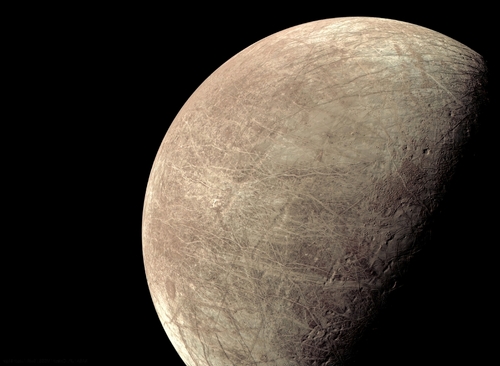Now Reading: Shifting Ice on Jupiter’s Europa Sparks Hints of Ocean and Life Potential
-
01
Shifting Ice on Jupiter’s Europa Sparks Hints of Ocean and Life Potential
Shifting Ice on Jupiter’s Europa Sparks Hints of Ocean and Life Potential

quick Summary
- Europa, a moon of Jupiter, is an exciting target in the search for extraterrestrial life due to its believed subsurface ocean beneath an icy shell.
- A new study, published in The Planetary Science Journal, reveals that Europa’s surface ice is constantly changing and exhibits areas of recrystallized crystalline ice, confirmed by spectral data from the James Webb Space Telescope (JWST).
- Researchers observed evidence of materials like sodium chloride, carbon dioxide, and hydrogen peroxide on regions where surface fractures occur. These may point to interior processes perhaps sourced from a subsurface ocean roughly 30 kilometers below.
- Despite this potential habitability factor, scientists remain uncertain about whether hydrothermal vents or seafloor volcanoes (essential for life on Earth) exist at the bottom of Europa’s ocean.
- NASA’s Europa Clipper spacecraft is scheduled to arrive at Europa in 2030 to investigate plumes or other signs that could indicate microbial life.
Read More: NASA’s Europa Clipper will Probe for life in The Plumes of Icy Moons
Indian Opinion Analysis
India has established itself as a notable contributor to global space exploration but remains relatively distant from missions directly linked to celestial bodies like jupiter’s moon. Scientific breakthroughs regarding europa’s dynamic surface and possible subsurface ocean highlight humanity’s growing capability to probe extraterrestrial environments. For India-where space research under ISRO has focused heavily on practical applications like Earth observation-it might serve as inspiration toward long-term investment into planetary science projects targeting outer moons.
exploring objects such as Europa aligns with larger philosophical quests about humanity’s place in the universe-a perspective increasingly appreciated even within developing Asian countries. Additionally, if missions such as NASA’s Europa Clipper confirm evidence of life-enabling conditions elsewhere in our solar system, scientific collaborations among space agencies globally could broaden-including mutual technology exchanges with India’s robust yet budget-conscious aerospace systems.
Advancing global knowledge serves collective progress; notably for nations like India that are striving toward balancing ingenuity with socio-economic priorities. Future planetary research would complement India’s growing profile internationally while contributing diverse perspectives rooted within civilizational curiosity about worlds beyond Earth.
Read More: Constantly Changing Ice on Jupiter’s Moon Hints at Possible Ocean
























